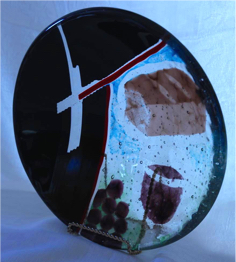Thoughts on the Eucharist – – and a Glass Bowl

The glass bowl I gave to Covenant represents some of my thoughts on the Eucharist (communion). At the time, I did not provide you with any description or interpretation, so let me share some of my thoughts with you.
When you look at this piece, one theme you will readily encounter is darkness and light. Likely each of you experiences darkness and light in a different way and frequency. For some of you, as you read my description, this may be a particularly bright day, full of love and grace. For others, it may be a day in which things seem pretty black or with shades of grey. But I think you will admit that, at times, all of us experience darkness, either by our nature, by our experiences of the day, month or year, or by issues related to our health, either physical, emotional or spiritual. For at least some of us, darkness comes even when we try hard to hold onto the light of faith. There are doubts.
Christian Wiman, in his essay “Love Bade Me Welcome (Gazing Into The Abyss),” speaks of a story by Simone Weil. Weil, he says, “describes two prisoners who are in solitary confinement next to each other. Between them is a thick stone wall. Over a period of time — and I think we have to imagine it as a very long time — they find a way to communicate using taps and scratches. The wall is what separates them, but it is also the only means they have of communicating.
The bowl shows a shaft of light piercing the darkness (incarnation) and, as it enters, it forms a cross. The red flowing from its centre represents Christ’s blood. However we grasp the mystery of Christ’s act of love and grace, we are immersed in His light. Our yearly, monthly or weekly participation in the Eucharist reminds us that whether we are experiencing dark times or good times, God’s love and grace are sufficient. For me the Eucharist is a time of celebration in good times and in very dark times, a ‘tap and scratch.’
Another theme, when I work with glass, is that of imperfection. No matter how carefully I work or how slowly I heat the glass, in the final result there are bubbles – imperfections. They remind me of my need of God’s grace. Maybe that is why I prefer to observe the Eucharist regularly and frequently. In my life things often are ‘Not the way they are supposed to be’ (Plantinga). I love the liturgy used in our church: “Behold what you are, become what you receive.” Come with your imperfections and receive God’s wonderful grace.
All of this may be self-evident from the bowl, but these are my thoughts. May God continue to bless you as you meet together to eat, drink and be nourished.
 Covenant Mennonite Church
Covenant Mennonite Church
